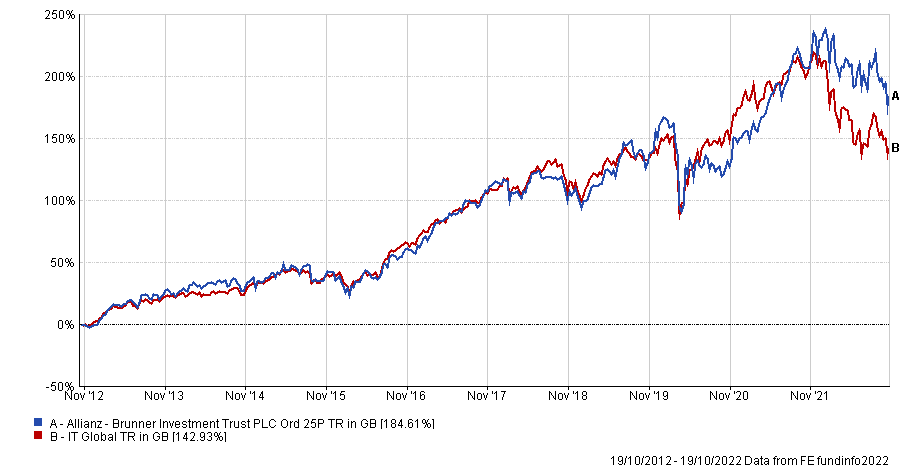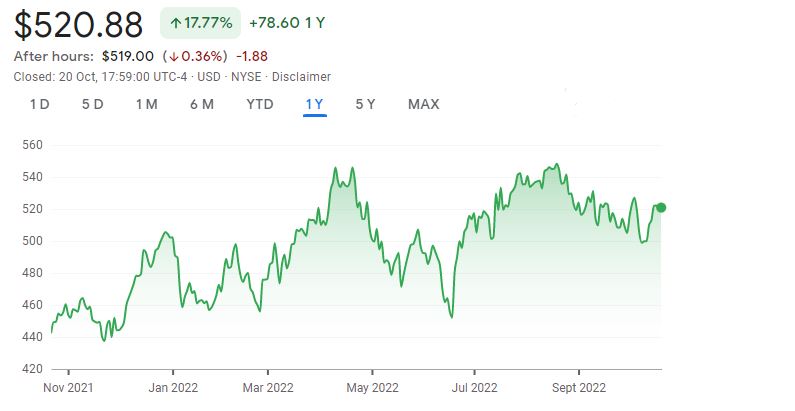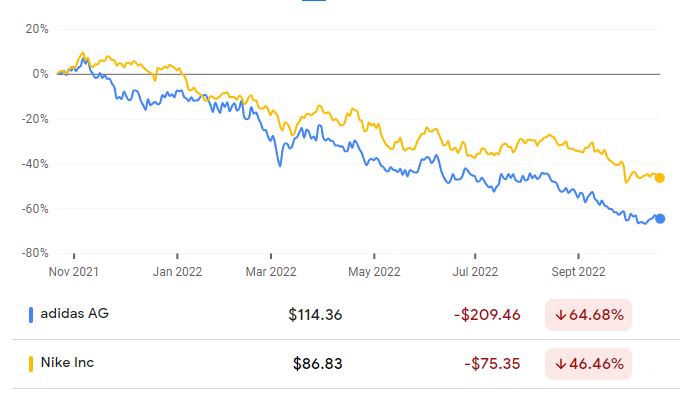When it comes to income, few portfolios can boast the track record of the Brunner Investment trust. Among the seven investment companies with more than 50 years of steadily growing dividends, the Association of Investment Companies ‘Dividend Hero’ has been a bastion of consistency for investors over the years.
Indeed, it has outperformed the IT Global sector by 41.7 percentage points over the past decade, delivering investors a total return of 184.6%. Although it sunk 6.6% over the past 12 months, it is within the top quartile of its peer group.
Current manager Christian Schneider, who took charge of the portfolio earlier this year, tells Trustnet why investors should not be fooled by a high dividend-paying company and why they might even be better off with a business paying no divided at all.
Total return of trust over the past 10 years

Source: FE Analytics
What is your investment process?
The fund has a dual goal of capital growth and income growth over time and we’ve been growing that income for 50 years now.
We do that by finding quality companies with sustainable, above-average returns, and we want businesses that can grow those revenues because that's what creates intrinsic value, capital growth and free cash flow growth, which then can be funnelled into dividend pay-outs.
Where do you find the highest dividend payers?
We’re not after the biggest dividend-paying companies. We want companies that are steadily growing and re-investing rather than mature businesses that are paying all their money to the shareholder, which is nice, but declines its value over time.
A high dividend can be a warning flag. It might be alright, but you have to look carefully at the underlying numbers and health of the company.
Take tobacco companies for example – it’s a very profitable business creating a lot of cashflow but there are few areas for them to invest in.
The number of smokers is shrinking so why would these companies build more factories? Growing the business doesn’t make sense so they just hike dividend pay-outs over time.
Some tech companies on the other hand have so many profitable investment projects ahead of them that they don’t pay any dividend at all.
We recently added Adobe, which doesn’t pay a dividend because there’s so much growth out there for them but it’s creating a lot of capital growth for us.
What has been your best performing stock over the past year?
Our largest holding and best performing stock was United Health, which is the US’ largest health insurer.
Return generated in GDP is up more than 50% in the past 12 months because it’s had a bit of a tailwind from Covid when more people were in hospital and had claims against their insurance.
Earnings were suppressed during Covid given the higher costs they had but we understood this would be temporary. Luckily now that we’re a bit back to normal the cost side has normalised and it’s providing a tailwind for United Health.
Share price of United Health over the past year
Source: Google Finance
What has been your worst performer?
Adidas, which is the world’s second largest sports equipment maker, has had a tough time to be honest, with a GDP decline in value of 55%. It’s very clean and scores well on environmental, social and governance (ESG) terms but this has actually had a negative impact on the business.
It was one of the big sports gear manufacturers to join the Cotton Initiative last year and pledged not to source cotton from forced labour camps in China.
There was a big backlash from the Chinese government and lots of Chinese influencers who’d supported them for a long time went against Adidas and stopped endorsing them.
This was quite a big market for the company and there was also the impact of inflation on consumer discretionary businesses on top of that.
It’s generally a good business because there’s a duopoly between Adidas and Nike and we like structures where there’s not too much competition. It’s still a good industry, it’s a good company and we’re sticking with it.
Share price of Adidas and Nike over the past year
Source: Google Finance
What sets you apart from your peers?
We don’t want our clients to be tossed around depending on whether growth is in favour or value is in favour. We’re providing more of a ‘Steady Eddie’ option. It’s a hare and the tortoise kind of thing and we’re more the tortoise.
Having recently become lead manager, how do you ensure consistency in the fund’s strategy?
I’ve been with the company for 22 years, 18 of which I worked closely with one of the previous managers, Lucy Macdonald. I joined the Brunner team about two years ago, so its hasn’t been a hard task ensuring that continuation there.
What are your interests outside of fund management?
I do a lot of sports – I run the odd marathon, play tennis with my daughter, go hiking in the mountains.







